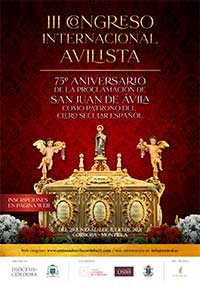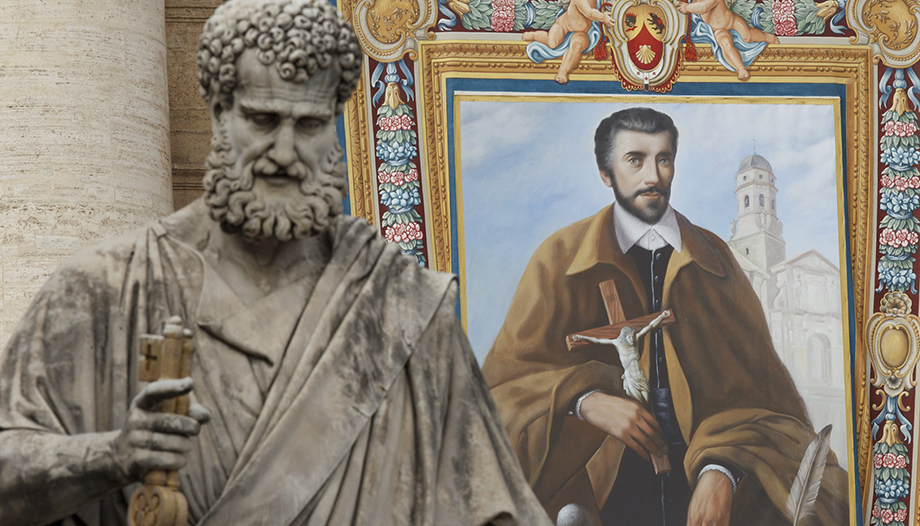St. John of Avila, Doctor of the Universal Church, will once again be the focus of reflection and study by scholars, priests and followers of the patron saint of the Spanish secular clergy at the III International Avilista Congress to be held in Cordoba and Montilla between June 29 and July 2, 2021.
A wide-ranging program shapes this meeting, which will include presentations on topics as varied as the "Avilist Feminine School", "The Sacred Humanity of Christ in Avilist Theology" and "Keys to Priestly Spirituality from St. Joseph to the style of St. John of Avila".
One of the people in charge of organizing this congress is the priest Carlos María GallardoProfessor of the Theological Study "San Pelagio" and Spiritual Director of the Diocesan Seminary of the Diocese of Cordoba. From the hand of this priest, who is very close to the town of Montilla where the saint lived and died, we know
It has been 75 years since the figure of St. John of Avila was proposed to the clergy as a model. In this time, has the life and work of this Spanish saint become better known?
-From the moment St. John of Avila was chosen as patron of the Spanish secular clergy, his figure and above all his eminently priestly spirituality were especially promoted. Many theologians began to dive into his works and found a singular richness that nourishes the soul at the same time. Among priests, too, he was found to be a sure teacher of the spiritual life that enkindles the hearts of those who wish to live their ministry to the full. It is significant that he was declared patron of the secular clergy while he was still Blessed, but this aroused the desire for his canonization and the recognition that is due to one who worked so hard during his lifetime for the holiness of priests and their proper formation.
At the beginning of the year, Pope Francis ordered the inclusion of the feast of St. John of Avila in the General Roman Calendar as a memorial ad libitum, highlighting his relevance to today's clergy.
-St. John of Avila has much to say to the secular clergy of today. Although we are talking about different centuries and distant in time, what the saint had to live is not very different from what we can live today in the world, in the Church.
But the holy master teaches us that the true secret to holiness is to look to Christ and live fully in love with him. It is the love of Christ and the love of Christ that stands out in the life and work of this giant and that is what he transmits to us priests of all times.
The value of the interior life, prayer, penance, dedication to the souls that God entrusts to us, exercising the ministry of spiritual paternity, preaching... is, in short, the essence of a priestly life filled with fire, the fire of God's love.
Love for Christ is what stands out in the life and work of St. John of Avila and that is what he transmits to us priests of all times.
Carlos Gallardo
St. John of Avila is one of the 34 Doctors of the Church, persons whose teachings are part of the Church's magisterial humus. In the case of St. John of Avila, what are the fundamental points of the magisterium of this holy priest?
-We find a vast magisterium in the holy doctor. He stands out as a humanist, reformer, preacher of the Gospel, spiritual master, catechist... there are many facets that converge in him. But there is a very common characteristic in all his writings. And it is that the holy master is capable of exposing and transmitting the deepest truths of our faith with theological rigor, but at the same time with an immense pastoral delicacy.
Reading his letters, for example, one discovers how he speaks to concrete people with concrete problems, how he is concerned about them and how he always knows how to present and place the mystery of Christ at the center. Very often we find a prayer in the middle of the letter that makes the reader stop to contemplate Christ, the "all beautiful" and be overwhelmed by the mystery of his love.
The holy master is capable of expounding the profound truths of our faith with theological rigor, but at the same time with immense pastoral delicacy.
Carlos Gallardo
Focusing specifically on the next congress that will take place in Cordoba and Montilla, what is your motivation and what fruits do you expect from this meeting?

-As we celebrate this year the 75th anniversary of the proclamation of St. John of Avila as patron of the Spanish secular clergy, it seemed to us that this event could not pass without further ado. For this reason it was necessary to organize an event that would make us, on the one hand, reflect and deepen our understanding of the life and work of the holy doctor and, on the other hand, facilitate the knowledge of St. John of Avila to all the people of God, because he has much to say to each one of us. His intention was always "that all may know that our God is love" and this must also continue to be our intention.
The congress is divided into four thematic blocks (history, theology, spirituality and current affairs). In these blocks there are three speakers together with a moderator in order to encourage dialogue and reflection among them. Some presentations are oriented to the priesthood and priestly formation, but others are open to other dimensions of Christian life that seek to enrich us all.
Another fundamental intention of the congress is to facilitate prayer and the encounter with God. For this reason, acts of worship and even a prayerful musical directed by the singer-songwriter José Manuel Montesinos, who has composed songs with lyrics taken from the works of St. John of Avila, are planned.
III Avilista Congress
The III Congress will have a double modality of participation: on-site and telematic. The online follow-up can be done through the website sanjuandeavilacordoba21.com. In the case of attendance in person, the sessions will be held in the assembly hall of the Bishopric of Cordoba (C/Torrijos, 12) up to a maximum of one hundred people. Registrations in both cases must be made through the web page web.
The physical attendees will also be able to visit the house where this Doctor of the Church lived and participate in the Eucharist in the Basilica of St. John of Avila in Montilla, presided over by the Cardinal Archbishop of Barcelona and president of the Spanish Episcopal Conference, Juan José Omella.








